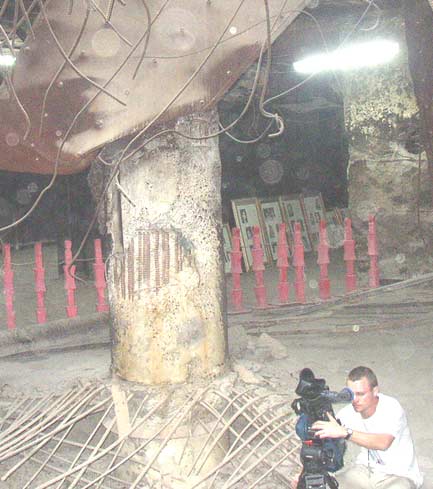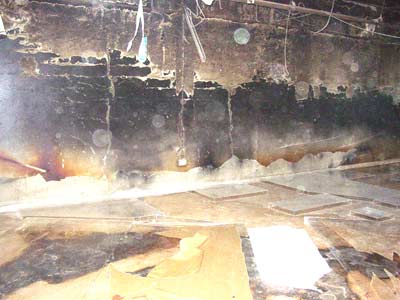Peace Team Details | Reports | Messages to
The Eyes of Children Looking Back at Us
 Have you ever seen the shadows left by incinerated bodies? I felt that I
must have imagined it, but I smelt it too - the burning bodies.
Have you ever seen the shadows left by incinerated bodies? I felt that I
must have imagined it, but I smelt it too - the burning bodies.
The Pentagon plans to open the war with two days of intensive bombing of
Baghdad and other targets in Iraq - between 300 and 400 cruise missiles each
day, each more than were used during the entire 40-day gulf war. This is
referred to as "shock and awe" and its explicit objective is psychological
destruction of the "enemy's" will to fight. Terror, one might say because
there is certainly no distinguishing between civilian and military targets
when hundreds of missiles are fired into densely populated areas.
We stood in the dark of the Al Ameriyah shelter. Light came from the
ceiling, through an obscene hole with the twisted metal bones of the
structure protruding from its grotesque lips. This is the place where a
group of Iraqis sought shelter during the bombing of Baghdad in the winter
of 1991. On February 13, two U.S. bombs hit the shelter and 408 women and
children were killed. The faces of some of the children killed that night
are framed and hanging on the blackened walls, close to where the shadows of
their bodies are burnt into the floor. Their eyes gaze into ours.
In response to Bush's state of the union address, the Iraq Peace Team had
organised a vigil at the shelter. Together with a large number of
international media, we were there, holding the banner and helping to read a
rebuttal to the most egregious of Bush's lies. The words seemed almost
superflous. Beyond all the painstaking and important work of unravelling
each of Bush's distortions, the fresh young faces demand of Bush a question
for which he has no answer.
 The ´shock and awe´ terrorism is already having its effect, even among those
who know that they can get away safely. "I hope you are going to be clever
and leave before they start," said a CBC reporter to us. "It isn't going to
be pretty this time." But the Iraq Peace Team does not intend to leave, and
many of the team members here are adjusting to the thought of being under
bombardment, making provisions for the time when they will be cut off from
the rest of the world like everyone else in Baghdad.
The ´shock and awe´ terrorism is already having its effect, even among those
who know that they can get away safely. "I hope you are going to be clever
and leave before they start," said a CBC reporter to us. "It isn't going to
be pretty this time." But the Iraq Peace Team does not intend to leave, and
many of the team members here are adjusting to the thought of being under
bombardment, making provisions for the time when they will be cut off from
the rest of the world like everyone else in Baghdad.
In Amman, Jordan we were urged by the Canadian embassy not to go into Iraq.
They warned us not to go into public places, and promised to rescue us -
with helicopters and troops, if necessary. They didn't warn us against
taking refuge in bomb shelters nor did they explain how helicopters could
dodge the cruise missiles. We have been to many public places since we have
been here, alone, and in small groups. Not once have we felt the slightest
sense of threat. On the contrary. Last night, while walking home, we were
hailed by some eager young men speeding by with, "we love you, we love you,
we love you!" "We distinguish between you and your governments," explained
an Iraqi journalist/translator I met casually a few days ago. Perhaps
surprisingly, that does seem to be the general attitude among the people of
this beautiful city. But how long can this last?
|